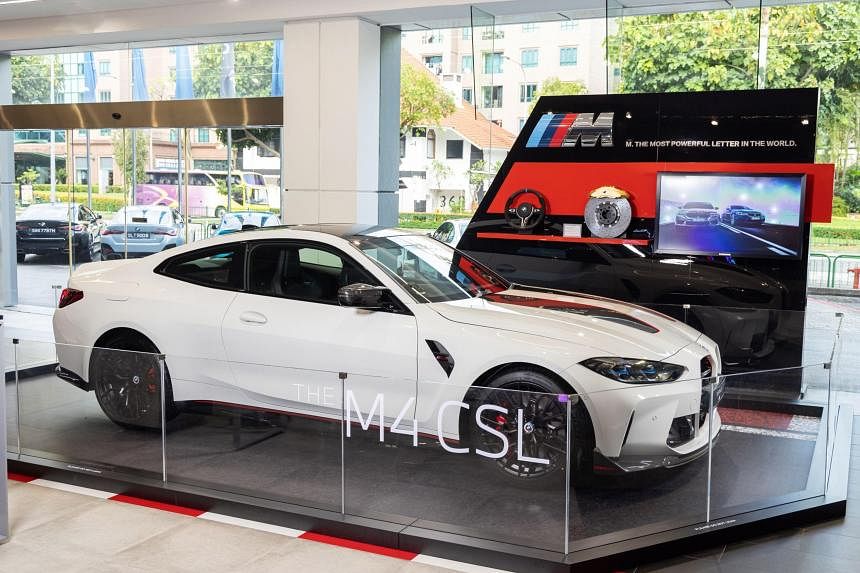Landed and sold
A unit of BMW’s rarefied M4 CSL has been delivered to a buyer in Singapore.
Estimated to cost more than $500,000 (BMW would not reveal the price) and limited to 1,000 units worldwide, the lightweight rear-wheel land missile is configured as a two-seater, with chassis upgrades and features to enhance track performance.
The street-legal variant of the BMW M4 GT3 race car, the M4 CSL holds the record for the fastest series-production BMW on the Nurburgring’s Nordschleife circuit, with a time of seven minutes and 20.207 seconds.
It hits 100kmh in 3.7 seconds and 200kmh in 10.7 seconds, with a top speed of 307kmh. The 3-litre engine makes 550hp and 650Nm.
Meanwhile, as part of BMW M’s 50th anniversary this year, the company has rolled out the limited-production BMW M4 Competition 50 Jahre. Three units, each priced at $567,888, are available in Singapore. The 3-litre car has 510hp and 650Nm, enabling it to reach 100kmh in 3.9 seconds and a regulated peak velocity of 250kmh.
MX-5 clocks 1,000km on bio-petrol
An off-the-shelf 181hp 2-litre Mazda MX-5 Roadster has established a benchmark lap time for a zero fossil fuel sustainable fuelled car.
Powered by Sustain 100% sustainable road fuel from Coryton, the MX-5 completed laps at Anglesey Circuit in Wales, Oulton Park in England, Knockhill in Scotland and Kirkistown in Northern Ireland. In total, the car covered 1,600km. The second-generation Coryton petrol was created using agricultural waste.
Audi launches most powerful RS6 Avant, RS7 Sportback
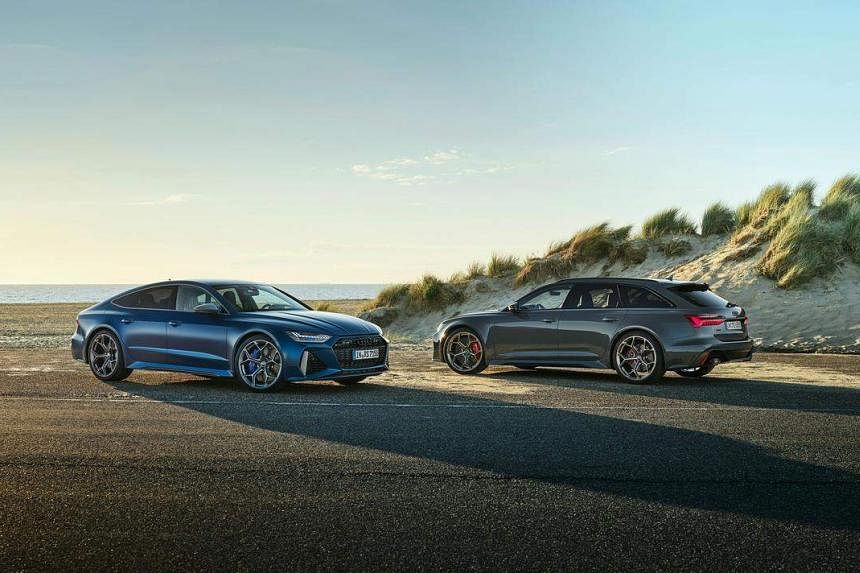
The new Audi RS6 Avant Performance and RS7 Sportback Performance have been unveiled and are said to be more powerful and faster than any RS6 and RS7 to date.
They are powered by a 4-litre V8 bi-turbo with 621hp and 850Nm of torque – almost 30hp and 50Nm more than their outgoing non-Performance twins. Their 0-100kmh sprint times have fallen by 0.2 seconds (RS6) and 3.4 seconds (RS7), aided by 22-inch lightweight wheels and high-performance tyres. Reduced sound insulation amplifies the cars’ V8 soundtrack.
Fuel cell BMW X5 on track for launch in early 2023
BMW has started producing its limited-series iX5 Hydrogen fuel cell model. Made in a pilot plant at its Munich Research and Innovation Centre, the cars will be used to demonstrate carbon-free mobility in selected regions from the second quarter of 2023.
Around 900 people work at the new centre, which houses a body shop, assembly line, and spaces for model engineering and concept vehicle construction.
Electric E-class from $415,888
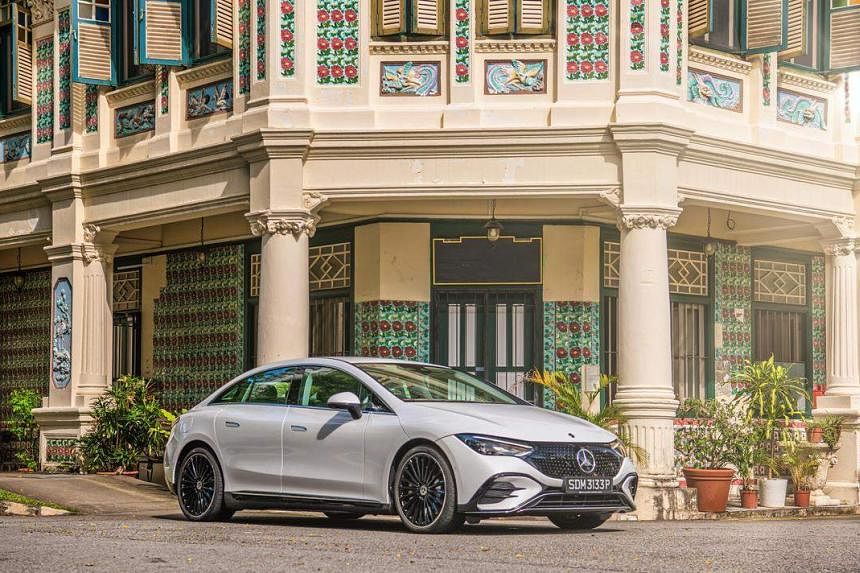
The new Mercedes-Benz EQE executive saloon is here, the latest in a flurry of electric Mercs to appear. Two variants are available – the rear-wheel-drive 215kW/565Nm Mercedes-EQ EQE 350+ ($415,888) and the all-wheel-drive 350kW/858Nm Mercedes-AMG EQE43 ($513,888).
The former hits 100kmh in 6.4 seconds and peaks at 210kmh, with a rated power consumption of 18.4kWh/100km. The latter reaches 100kmh in 4.2 seconds and also peaks at 210kmh, with a claimed power consumption of 20.9kWh/100km.
The EQE – at 4,964mm long, 1,900mm wide and 1,495mm tall (1,503mm for the EQE 350+), with a generous wheelbase of 3,120mm – is a tad larger than the Mercedes-Benz E-class.
BMW’s cheapest X model starts at $243,888
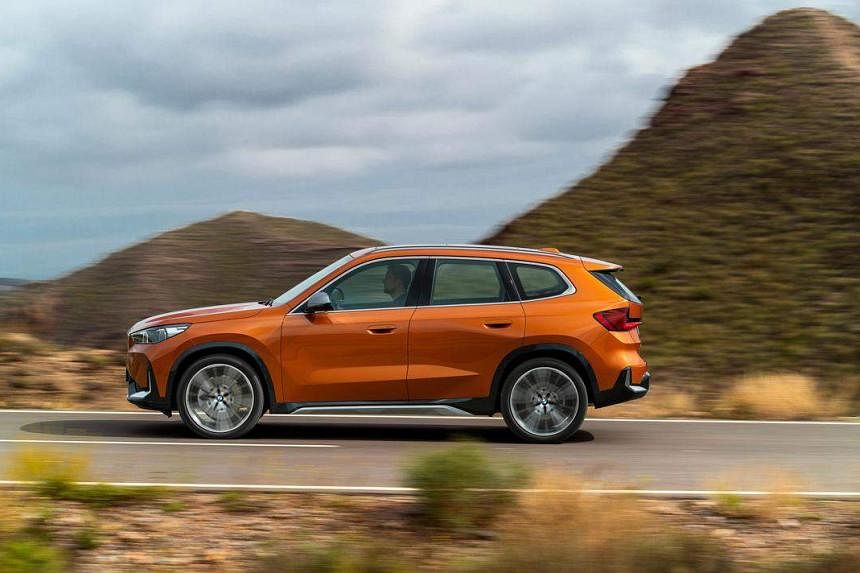
BMW’s latest X1 has landed. It is the first X model to qualify for COE Category A.
The third generation of BMW’s smallest crossover has grown, now measuring 4,500mm long (an additional 53mm), 1,845mm wide (an additional 24mm) and 1,642mm tall (an additional 44mm). Its wheelbase of 2,692mm is 22mm longer than its predecessor’s. Track widths have increased by 31mm to 1,592mm in front and 1,593mm at the back.
The car is powered by a 1.5-litre turbo engine detuned to make 122hp and 230Nm. Via a seven-speed dual-clutch gearbox, the output goes to the front wheels. The X1 promises a fuel economy of 6.8 litres/100km and reaches 100kmh in a somewhat leisurely 10.5 seconds, with peak velocity still at a respectable 200kmh.
Prices start at $243,888.
BMW Group adds Vietnam to list of Asian production locations
BMW Group has partnered Vietnam’s Truong Hai Auto Corp to produce BMW vehicles in the South-east Asian country. Currently, in Asia, the Bavarian brand has plants in India, Thailand, China, Malaysia and Indonesia.
Models to be produced in Vietnam include the 3-series, 5-series, X3 and X5. Interestingly, Vietnam’s five-year-old home-grown car brand VinFast has a line-up of vehicles based on previous-generation BMWs.
An off-road Lamborghini Huracan
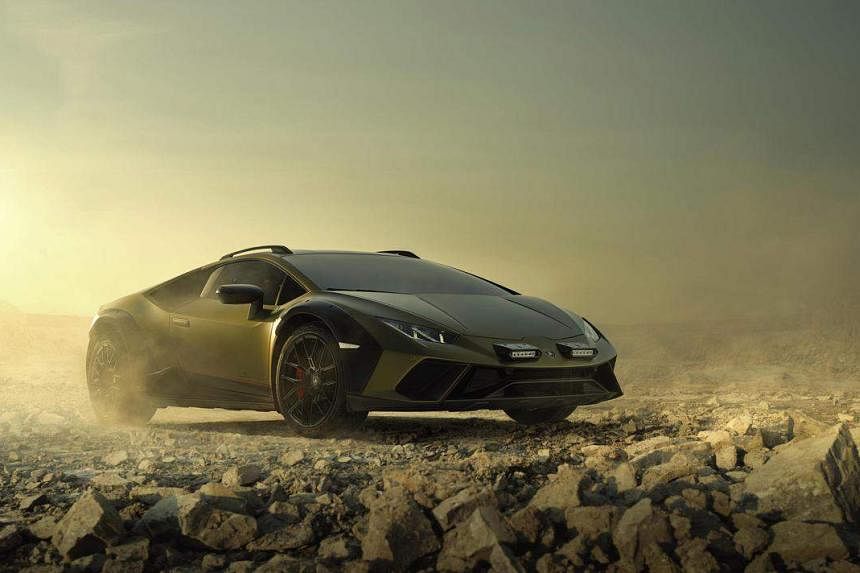
Hot on the heels of Porsche’s audacious 911 Dakar (an off-road variant of the iconic sports car), Lamborghini has unveiled its Huracan Sterrato.
The multi-terrain Lambo comes with an updated version of the Lamborghini Integrated Vehicle Dynamics system, with a new Rally drive mode for low-grip conditions.
Like the Huracan, the Sterrato has a 5.2-litre V10. It makes 610hp and 560Nm of torque, which goes to all wheels via a seven-speed dual-clutch transmission. It hits 100kmh in 3.4 seconds (on well-paved tarmac) and reaches a tamer top speed of 260kmh.
Ground clearance has been increased by 44mm, while the front and rear tracks have been widened by 30mm and 34mm respectively.
BYD looking at producing batteries in the US in anti-protectionist move
Chinese automaker BYD is considering building a battery plant in the United States, but does not currently plan on selling its electric cars there, Bloomberg reported.
The media outlet quoted a top executive: “Currently, we don’t plan on selling in the US. We need a better understanding of what the next steps are.”
BYD executive vice-president Stella Li said: “We’ll continue to invest in electric school buses and also battery components, but for consumer cars, we haven’t got a decision yet.”
As an automaker with large manufacturing capabilities and a vertically integrated supply chain stretching from batteries to chips, BYD stands to lose from the US government’s efforts to rebalance the sector away from China.
The US Inflation Reduction Act, which President Joe Biden passed in August, is pushing electric vehicle makers globally to produce more vehicles in North America and secure the key minerals for them outside China.
